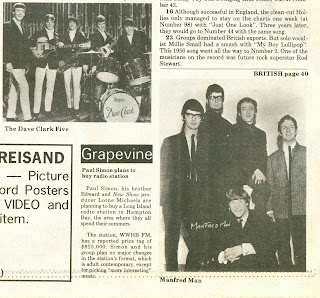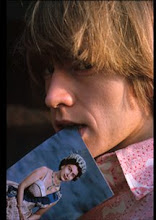
I find it disheartening that most regard the
Yardbirds as merely a catalyst for three of the world's most revered guitar heroes--they could claim Eric Clapton, Jeff Beck and Jimmy Page among their ranks--when in fact, they were one of the most innovative bands of their era. Even a cursory listen to their catalog reveals how they evolved, incorporating various musical styles (not just the blues) into their original songs. My favorite of their albums is
Roger the Engineer, featuring Jeff Beck on lead guitar, followed closely by the oft-maligned psychedelic
Little Games, where Page first uses the violin bow technique he cribbed from Creation guitarist Eddie Phillips.
The core members of what eventually became the
Yardbirds aligned their talents together in May of 1963 as the
MBQ: Keith
Relf - vocals, harmonica; Chris
Dreja - rhythm guitar; Tony
Topham - lead guitar; Paul
Samwell-Smith - bass; Jim
McCartey - drums.
Relf suggested the name change, stating that the term "
Yardbird" referred to "hobos who hang around railroad yards." When
Topham left the group, future "
slowhand" legend Eric Clapton auditioned for the band and played his first gig with them in October of '63. By this time the
Yardbirds had already taken over the Rolling Stones' residency at the
Crawdaddy Club. The first video clip showcases "Louise," a John Lee Hooker classic, during a Summer of '64 appearance on a German television. Notice fresh-faced 19 year-old Clapton on lead guitar!
Clapton became increasingly discouraged with the band as they moved into more commercial territory and further away from traditional blues. He performed on their debut, the incendiary
Five Live Yardbirds (one of the greatest live albums ever) but left soon after recording the Graham
Gouldman ("Bus Stop," "No Milk Today") penned "For Your Love." (
Gouldman also wrote "Heart Full of Soul; he was later a member of 10cc with former
Mindbender Eric Stewart, Kevin
Godley, and
Lol Creme.) Session musician Jimmy Page was approached to join the
Yardbirds; he declined, and the spot was filled by Jeff Beck. Later, when
Samwell-Smith left the band, Jimmy Page joined as rhythm guitarist and eventually took over lead duties after Beck's departure.
As Relf and McCarty embraced psychedelia, a schism developed within the band. Eventually Jimmy Page was the only member left in the
Yardbirds, so he recruited new members Robert Plant, John Paul Jones and John
Bonham. They played some gigs under the
Yardbirds' moniker, but threat of legal action by Chris
Dreja forced a name change. In reference to Keith Moon's quip that their music would "go over like a lead balloon," the group was newly christened "Led Zeppelin."
(References: Blues-Rock Explosion,
edited by McStravic and Roos, with contributions by Jeff Watt; Ugly Things issue #20 2002; British Beat by May and Phillips)







































